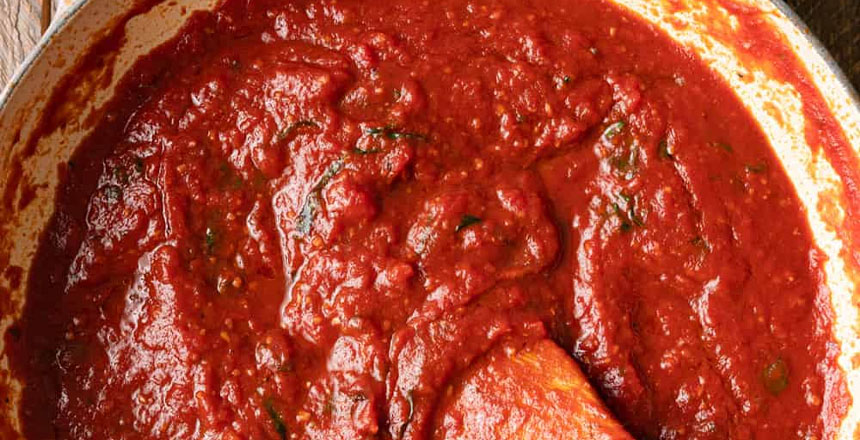If you love pasta and Italian cuisine then you are probably familiar with spaghetti sauce. It is a delicious, savory topping that can add mouth-watering flavor to any traditional Italian dish. But sometimes homemade sauces can be too runny or thin, which makes them difficult to serve over pasta dishes without making a mess.
Don’t worry. In this blog post, we will explore the various methods of thickening your spaghetti sauce so that it stays in place and adds an extra layer of taste to your meal.
Keep reading for tips on how to make your spaghetti sauce thicker and more flavorful than ever before.
Related:
- What Is Brie Cheese And How to Eat Brie Cheese
- How To Cook Frozen Crab Legs
- How To Cook Brats In The Oven
Definition of Spaghetti Sauce

Spaghetti sauce, also known as a marinara sauce or tomato sauce, is a type of sauce that is typically served with spaghetti or other dishes made with pasta. It is made from a base of tomatoes, usually with added onions, garlic, and herbs such as oregano and basil. Some recipes may also include ingredients such as red pepper flakes or sugar to adjust the flavor.
Spaghetti sauce can be homemade or purchased in jars or cans at grocery stores. It is a versatile dish that can be served over any type of pasta, from spaghetti to macaroni. It can also be used as a pizza topping or in casseroles and other dishes.
Is It Necessary for Spaghetti Sauce to Have a Thick Consistency?

The thickness of spaghetti sauce can be described as a matter of personal preference and can vary depending on the recipe and intended use. Some people prefer a thick, hearty sauce, while others prefer a lighter, more liquid consistency.
However, in general, spaghetti sauce should have some thickness to it in order to adhere to the pasta and provide flavor. If the consistency of the sauce is too runny, it may not coat the pasta properly and can result in a bland or watery taste.
How to Thicken Spaghetti Sauce?
When it comes to cooking spaghetti sauce, achieving the perfect consistency can make all the difference in the final dish. Sometimes, the sauce may turn out too watery or thin, which can result in a less flavorful pasta dish. Fortunately, there are several methods that can be used to thicken spaghetti sauce, depending on the ingredients available and the desired texture.
1. Simmering Your Sauce:
If the sauce is too thin, you can use the heat of the stove to reduce the liquid content and make it thicker. Simmer this sauce over low heat while stirring it occasionally. This will allow some of the moisture to evaporate, resulting in a thicker sauce.
It’s important to watch closely the sauce while it’s simmering and blend it regularly to prevent burning.
2. Incorporating Roux:
If simmering the spaghetti sauce for an extended time does not result in the desired thickness, it may be necessary to introduce a thickening agent such as roux.
A roux refers to a blend of the same quantity parts fat and flour that is used as a thickening agent for sauces and gravies. To make a roux, melt butter in a pot over medium heat and then add an equal amount of flour. Stir the mixture until it forms a thick paste, then slowly whisk in the spaghetti sauce while stirring constantly. This will make the sauce thicker and also give it a richer flavor.
3. Adding Cornstarch:
Another common way to thicken spaghetti sauce is to add cornstarch or arrowroot powder.
Start by mixing a tablespoon of cornstarch or arrowroot powder in a cup of cold water until it dissolves completely. Then add the mixture slowly to the sauce while stirring constantly. The starch will thicken the sauce as it cooks and give it a glossy finish.
4. Adding Mashed Potatoes:
In addition to the methods mentioned earlier, adding mashed potatoes is another option for thickening spaghetti sauce.
This technique involves mashing cooked potatoes and then mixing them into the sauce until it reaches the desired consistency. As the potatoes contain starch, they will help to thicken the sauce naturally at the same time as also adding a creamy texture. This method works particularly well with tomato-based sauces, and it is an excellent way to use up leftover mashed potatoes.
However, it is essential to ensure that the potatoes are thoroughly mixed into the sauce to prevent clumps and to adjust the seasoning as needed to ensure that the final dish retains its flavor profile.
5. Cooking The Pasta Directly in The Sauce.
Cooking your pasta directly in the spaghetti sauce is a traditional method that can also help to thicken the sauce. As the pasta cooks, the starch is released into the sauce, adding thickness and flavor. This method is particularly useful if you desire a richer, more flavorful sauce and don’t want to use any additional thickening agents.
It’s essential to keep a close eye on the pasta and sauce while cooking, ensuring that the heat is not too high, and stirring regularly to prevent burning or sticking. If you find that the sauce is still too thin, you can continue to cook it for a few more minutes to evaporate some of the liquid and thicken it further.
6. Incorporating Vegetables Into The Sauce.
Incorporating vegetables into your spaghetti sauce can not only enhance its flavor and nutrition but also make it thicker. Vegetables such as carrots, celery, onions, and peppers are a great option for this method, as they release moisture when cooked, which can help to thicken the sauce.
To use this method, chop the vegetables into small pieces and add them within the sauce while it cooks. Allow the vegetables to cook over low heat, stirring occasionally, until they are soft and tender. As the vegetables cook, they will release their moisture into the sauce, resulting in a thicker consistency.
7. Putting In Ground Beef or Sausage:
Adding ground beef or sausage to your spaghetti sauce can not only thicken it but also add a delicious flavor to the dish. This method is simple and easy to execute.
To start, brown the ground beef or sausage in a separate pan with some oil and spices, such as garlic, onion, and oregano. Once the meat is cooked through, drain any excess fat and add it to the pot of sauce while continuously stirring. The fat from the meat will help thicken the sauce, giving it a richer texture and flavor.
What Steps to Take to Avoid Watery Spaghetti Sauce?
The best way to make sure that your spaghetti sauce does not end up reducing the amount of liquid in the sauce cook it separately from the pasta. This allows you to control the cooking time and thickness of the sauce better, ensuring that it does not become too diluted from boiling in the same pot as the pasta.
When making spaghetti sauce, it is important to let the sauce simmer for a longer length of time before adding any additional ingredients. This allows the water in the sauce to turn from a liquid state into vapor or steam, which leads to the sauce becoming a thicker and more flavorful finished product that won’t be overly watery.
When serving the spaghetti, avoid using a regular spoon to scoop out the sauce. Instead, opt for a slotted spoon, which will allow any excess liquid to stay in the pot. This simple technique can go a long way towards preventing watery sauce and ensuring that you get a rich and flavorful dish every time.
FAQs
What is The Best Thickening Agent for Spaghetti Sauce?
The best thickening agent for spaghetti sauce is tomato paste. Tomato paste adds a deep and rich flavor to the dish without overpowering it, and it helps to add thickness to the sauce naturally.
How Long Should I Simmer My Spaghetti Sauce?
It is best to simmer the sauce for at least 30 minutes before adding any additional ingredients. This will allow enough time for the water in the sauce to evaporate, resulting in a thicker and more flavorful finished product.
Can I Use Cornstarch to Make The Spaghetti Sauce Thicker?
Yes, you can use cornstarch to thicken spaghetti sauce. Cornstarch is a powerful thickening agent that should be used sparingly and mixed with a small amount of cold water before being added to the sauce.
What is The Most Effective Method to Thicken Watery Sauce?
The best way to thicken the watery sauce is to simmer it for a longer period of time and avoid adding too much liquid when preparing the dish. You can also add tomato paste, vegetables, ground beef, or sausage to the sauce while cooking to help thicken it up.
Is It Better to Use Flour or Cornstarch to Thicken Sauce?
It is generally best to use cornstarch as a thickening agent for sauces, as it helps to thicken the sauce without giving it an overpowering flavor. Flour can also be used, but it should be added in smaller amounts and mixed with cold water before being added to the sauce.
Conclusion
You now know how to thicken spaghetti sauce like a pro. Taking the time to add a thickener such as a roux or pureed vegetables will ensure that your pasta sauce has a perfect consistency and is guaranteed to impress your guests.
If you’re short on time, adding cornstarch mixed with water to your sauce is an excellent way to get it just right for serving. Moreover, if you prefer a lighter taste, reducing the liquid left in your sauce by cooking it for longer can also be effective.
Regardless of which method you choose for thickening your spaghetti sauce, always remember not to add too much at once otherwise the texture will suffer from being overly thick and the flavor won’t be as enjoyable. With these tips and tricks in mind, you can feel confident creating delicious spaghetti sauces that everyone will enjoy.


